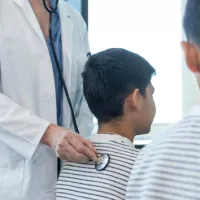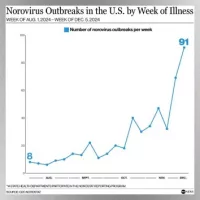
(NEW YORK) — U.S. Surgeon General Dr. Vivek Murthy said he believes 13 is too young for children to be on social media platforms, despite some of the most popular platforms, including Facebook and Instagram, allowing users to be that age.
Murthy told CNN on Sunday that he believes being on social media “does a disservice” to kids early in their teen years.
“I, personally, based on the data I’ve seen, believe that 13 is too early,” Murthy said on CNN Newsroom. “It’s a time where it’s really important for us to be thoughtful about what’s going into how they think about their own self-worth and their relationships and the skewed and often distorted environment of social media often does a disservice to many of those children.”
Murthy did not say if there will be any official guidelines or advisory based on that perspective.
Meta, the parent company of Facebook and Instagram, requires users to be at least 13 years old to use its platforms, according to the company’s website.
TikTok and Snapchat each also require users to be at least 13 years old, according to their respective websites.
Google, the parent company of YouTube, does not allow kids under age 13 to create their own Google Account. YouTube allows parents to set up a “supervised account” for a child under age 13, for which they can control the content settings, according to its website.
In most cases, the social media sites require people to enter their birth dates in order to sign up as users.
Murthy said he would like to see parents “band together” to keep their young teens off social media given they are allowed on the platforms starting at age 13.
“If parents can band together and say you know, as a group, we’re not going to allow our kids to use social media until 16 or 17 or 18 or whatever age they choose, that’s a much more effective strategy in making sure your kids don’t get exposed to harm early,” he told CNN.
Murthy’s comments come just over one year after he issued an advisory highlighting a crisis in youth mental health, and said the need to address the issue was “critical.”
Murthy’s advisory noted that technology can have many benefits for youth, but can also expose kids to unhealthy content. It also urged stakeholders throughout society to take action to address youth mental health challenges.
Social media use is linked with symptoms of depression and anxiety, body image issues, and lower life satisfaction for some teens and adolescents, research shows. Heavy social media use around the time adolescents go through puberty is linked with lower life satisfaction one year later, one large study found.
But not every teen has those experiences. Researchers are still working to understand who’s most at risk of negative effects from social media, and it’s not clear yet if there are differences in mental health effects based on when kids first start using social media.
“We still know very little about what age is right for young people to start using social media, especially as social media use is very varied and impacts different people in different ways,” Amy Orben, a psychologist who heads the Digital Mental Health program at the University of Cambridge, said in an email to ABC News.
Tips for parents
With social media such a prevalent part of daily life, it may seem overwhelming for some parents to try to limit their child’s use.
The Centers for Disease Control and Prevention recommends no more than two hours of screen time or social media use a day for young people.
For children under the age of 2, the American Academy of Pediatrics recommends no screen time at all.
For older kids, limits on screen time should be individualized and age-based, according to the AAP.
The AAP recommends parents encourage physical activity, set social media and screen time limits for older kids — such as not going on social media while doing homework — and create unplugged spaces, like the dinner table, in the home. The organization also recommends parents create a “Family Media Plan” with their kids that can help set priorities and act as a type of contract.
In 2019, ABC News’ Diane Sawyer led a special report, that looked at the impact of screen time and social media.
In the special, a panel of experts shared tips for parents looking to rein in children and teenagers’ use of technology, in their homes and in their day-to-day lives.
Here are their seven tips:
1. Children younger than 18 months should avoid screens entirely with the occasional exception of a few minutes of FaceTime with family, according to Dr. Kathy Hirsh-Pasek, director of Temple University’s Infant Language Lab, and Tracy Dennis-Tiwary, a professor of psychology at New York’s Hunter College and the Graduate Center of the City University of New York.
2. For children older than the age of 2, limit screen use to one hour with parental supervision, according to Hirsh-Pasek and Dennis-Tiwary.
3. Have an open-ended discussion about screen time in the house and what family members feel they need. Allow everyone to weigh in on the conversation, according to husband-and-wife therapists Don and Carrie Cole of the renowned Gottman Institute in Seattle.
4. Agree on some simple things, like establishing one phone-free hour after dinner so that everyone can do something together, Don and Carrie Cole recommend.
5. Use social media to connect with each other rather than making it the enemy, according to the Coles.
6. If there’s conflict or the screen-time plan doesn’t seem to be working, take a deep breath, be kind to each other and begin again — without criticism, defensiveness or contempt, according to the Coles.
7. Discuss the consequences for breaking a screen time limit ahead of time so that if your child has a meltdown, the consequence is known, according to Don Cole.
Copyright © 2023, ABC Audio. All rights reserved.















